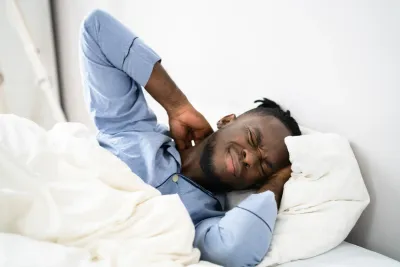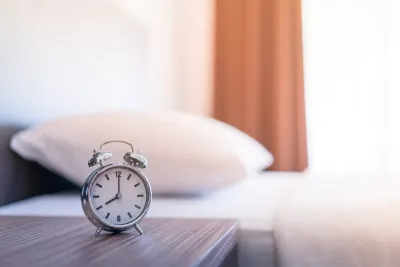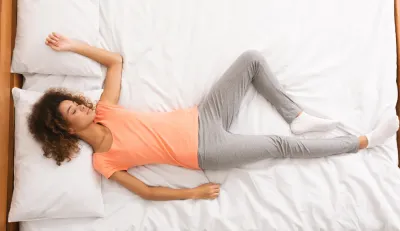How Pain Impacts Sleep: Understanding the Connection
Ana Marie Schick: Resident Sleep Expert and Certified Health Coach • Jan 02, 2025

Key Takeaways
Pain and sleep are deeply connected, creating a cycle where discomfort disrupts rest and poor sleep heightens pain sensitivity.
- Chronic pain and poor sleep reinforce each other, as pain makes it harder to fall and stay asleep while sleep loss amplifies how intensely pain is felt.
- Pain alters brain chemistry and sleep architecture, reducing time spent in deep and REM sleep stages that are critical for physical repair and recovery.
- Even during sleep, ongoing discomfort can keep the nervous system in a heightened alert state, lowering sleep quality without fully waking you.
- Disrupted sleep from pain is linked to increased inflammation, reduced pain tolerance, and slower healing over time.
- Managing sleep environment factors, including temperature regulation with cooling systems like the Chilipad Dock Pro, can help reduce discomfort and support deeper, more restorative rest.
Every year, a common goal for many people is to try and get more quality sleep. However, if you're one of the millions who deal with acute or chronic pain, getting a quality night's sleep is no easy task. In addition to not being able to sleep well at night, the relationship between sleep and pain can be a vicious cycle.
We've all been there – pain affects sleep, and it's a vicious cycle. When we're in pain, our bodies go into overdrive, making it tough to fall asleep and stay asleep. It's like our nervous system is constantly on high alert, keeping us from getting the rest we desperately need.
And when we don't sleep well, we feel even worse, making the pain seem even more unbearable.
- Increased stress
- Depression
- Anxiety
- Weakened immune system
Unfortunately, all of these issues could inadvertently affect your ability to manage your body pain, which you become more sensitive to when you are low on rest.
Understanding the Different Types of Pain
You might be surprised to learn that there are different types of pain: Acute, Chronic, Neuropathic, and Nociceptive. Recognizing these differences can significantly impact your approach to pain management.
Once you understand each type of pain, you’ll find the relationship between pain and sleep and ways to help you sleep better if you suffer from any pain.
Acute Pain
Acute pain is temporary discomfort that typically results from a specific injury or medical event, such as a broken bone, surgery, or severe burn. Unlike chronic pain, which can linger for months or even years, acute pain usually subsides within six months.
The intense discomfort of acute pain can significantly disrupt sleep patterns. The constant throbbing, sharp pangs, or even the fear of movement associated with this pain can make it incredibly difficult to fall asleep and stay asleep.
This can lead to frequent awakenings, shortened sleep duration, and ultimately, a significant impact on overall sleep quality.
Chronic Pain
Chronic pain is a persistent and ongoing discomfort lasting up to six months or longer, often without a clear cause. Unlike the temporary nature of acute pain, chronic pain can significantly impact daily life, including sleep.
The constant presence of this discomfort can make it challenging to relax and fall asleep. Furthermore, pain can cause frequent awakenings throughout the night, leading to insufficient and fragmented sleep.
The resulting sleep deprivation can worsen the pain itself, creating a vicious cycle where poor sleep exacerbates the pain, and the pain further disrupts sleep. This chronic disruption of sleep can have a profound impact on a person's physical and mental health.
Neuropathic Pain
Neuropathic pain is a type of pain that occurs when there's damage or dysfunction in the nervous system. Imagine your nerves as wires that send messages to your brain. When these wires get damaged, they can send faulty signals, leading to pain even when there's no actual injury.
This pain can feel different for everyone, but it often includes burning, tingling, shooting, or even electric shock sensations. It can be constant or come and go, and it can significantly impact a person's daily life, including resulting in poor sleep quality.
Nociceptive Pain
Nociceptive pain is the most common type of pain and occurs when there's damage to your body's tissues. Imagine stubbing your toe, spraining your ankle, or having a toothache – that's nociceptive pain in action. It's your body's way of alerting you to an injury. This type of pain can range from sharp and sudden to dull and aching.
While usually temporary, even short-term nociceptive pain can significantly disrupt sleep. The discomfort can make it difficult to fall asleep and stay asleep, potentially leading to frequent awakenings and poor sleep quality, which no one likes.
Related Blog: Want to wake up feeling refreshed? Learn more about the best sleeping style for your body and reduce pain.
Pain Keeps You Restless. Temperature Should Not.
When discomfort already makes sleep hard, overheating only adds fuel to the fire. The Chilipad controls your bed temperature with water powered tech, helping your body relax, stay asleep longer, and recover overnight.
The Science Behind Pain and Sleep
The intricate relationship between sleep and chronic pain is a two-way street, where each influences the other. Understanding this connection is key to developing effective pain management strategies.
When you're in pain, getting a good night's sleep can feel impossible, and poor sleep can make pain even worse. This cycle can leave you feeling stuck and exhausted. Understanding the science behind sleep and pain can help you identify ways to break this cycle, ultimately improving your sleep and pain levels.
The Role of Sleep in Pain Regulation
Sleep plays an important role in how we perceive and manage pain. During sleep, your body acts like a reset button. As you sleep, our bodies release chemicals such as endorphins, which serve as natural pain relievers.
Your body also focuses on repairing tissues and calming inflammation, both of which are crucial for effective pain management.
When you get a good night's sleep, your body becomes more equipped to handle chronic pain or other types of pain or discomfort. Sleep is an important component of any pain management plan. It's like giving your body the tools it needs to keep pain in check.
Potential Mechanisms Underlying the Relationship Between Sleep Deficiency and Pain
Research has identified several mechanisms that underlie the relationship between sleep deficiency and pain, including:
- The Opioid System: Can be reduced by sleep deprivation. These natural painkillers play a crucial role in pain modulation, and their decline can exacerbate pain.
- The Monoaminergic System: Reduced levels of neurotransmitters like serotonin and dopamine, key components of the monoaminergic system, can result from sleep deprivation. These neurotransmitters play a significant role in pain modulation, and their decline can increase pain sensitivity.
- The Orexinergic System: An increase in orexin production, a neurotransmitter that regulates arousal and wakefulness, can result from sleep deprivation. Elevated orexin levels can interfere with sleep onset and maintenance, potentially exacerbating pain.
- The Immune System: Increased production of pro-inflammatory cytokines, which can contribute to pain, may occur during sleep deprivation. Inflammation is a common source of pain, and insufficient sleep can impair the body's ability to manage inflammation effectively.
How to Minimize Pain to Sleep Better
Whether you're suffering from acute pain or chronic pain, there are a variety of solutions that don't necessarily have to do with over-the-counter medicine or pain relievers.
Note: It's important to understand that if you're frequently in pain, consult your doctor to explore your options to help with pain management.
Sleep Hygiene
Let's begin by understanding what sleep hygiene is. Good sleep hygiene involves adopting regular habits and practices that promote consistent sleep.
This includes regulating your exposure to natural light, avoiding stimulants such as alcohol and coffee close to bedtime, turning off technology to reduce blue light, getting regular exercise and more.
Poor sleep can exacerbate pain sensitivity and contribute to a cycle of discomfort, making it crucial to maintain good sleep hygiene.
Maintaining good sleep hygiene is important for preventing sleep problems and common sleep disorders. By regulating your sleep habits, you can create an environment that promotes better sleep, helping manage sleep disturbances and pain more effectively.
Even if pain affects your ability to fall asleep, regularly practicing a healthy sleep routine could help you combat the negative ways in which pain affects your sleep.
Psychological Techniques
While some rely on altering sleep habits, others have decided to take a more psychological approach, essentially “mind over matter”. A few practices that may be helpful include:
- Meditation
- Positive visualization
- Hypnosis
They could improve an individual's outlook or help to compartmentalize worry, pain and overall stress.
Sleep Study: Psychological Techniques and Better Sleep
Hypnosis may help individuals associate certain actions with falling asleep. Again, it's important to note that different tactics work for some more than others.
Note: Always speak with your doctor before trying something new or changing your regimen.
Improved Sleep Environment to Reduce Sleep Disturbances
Along with creating healthy habits and taking unique measures to reduce night pain or simply help you fall asleep more easily, it's crucial to focus on your sleep environment.
Take time to evaluate the fabrics and products in your bedroom. Consider purchasing something like a neck pillow or support wedge to help you sleep more comfortably. Depending on your desired sleep temperature, consider things like the fabric of your pajamas, sheets, and general room temperature.
If your chronic pain or illness results in your inability to regulate your body temperature, consider a product like our heating and cooling mattress pad, the Chilipad Dock Pro. We also offer the Cube, the original mattress cooling pad for your bed. These bed coolers can control sleep temperature from 55-115°F / 13-46°C.
Customers can use these cooling mattress pads to create a more ideal sleeping environment, helping them gain quality sleep for longer periods of time.
Consider solutions like these bed cooling systems if you’re suffering from chronic or acute pain, sleep disturbances, or lack of sleep. As we mentioned, always consult with your doctor before seeking additional treatment or changing your routine.
However, just because you’re experiencing muscle pain doesn’t mean you shouldn’t be able to sleep deeper and get a good night’s sleep.
Did You Know: Sleep apnea, a significant sleep disorder often found in individuals with chronic pain, is associated with increased pain sensitivity, emphasizing the need for addressing sleep disorders in pain management strategies to improve overall health.
Lifestyle Changes for Better Sleep and Pain Management
Making lifestyle changes can help improve sleep quality and reduce chronic pain, including:
Exercise and Physical Activity
Want a better night's sleep and a little less pain? Moving your body regularly can work wonders! Exercise can help you fall asleep faster and stay asleep longer, thanks to its ability to reduce stress and anxiety, which often keep us tossing and turning.
Plus, it can boost your mood and improve pain sensitivity, making it easier to relax and drift off. So, if you're looking for a natural way to improve your sleep quality and overall well-being, consider adding some regular exercise to your routine.
Here are some types of exercises that can be particularly beneficial:
- Aerobic Exercise: Walking, cycling, running, and swimming are examples of exercises that can improve sleep quality and reduce chronic pain. These activities increase heart rate and promote the release of endorphins, which can help alleviate pain.
- Resistance Training: Weightlifting, CrossFit, and resistance band exercises are examples of activities that can improve sleep quality and reduce chronic pain. Building muscle strength can support better posture and reduce the strain on painful areas.
- Flexibility Exercises: Yoga and Pilates are examples of exercises that can improve sleep quality and reduce chronic pain. These exercises enhance flexibility and reduce muscle tension, which can contribute to a more restful sleep.
Final Thought
The relationship between sleep and pain is complex but crucial. Poor sleep can worsen pain, while chronic pain can significantly disrupt sleep. This creates a vicious cycle that can negatively impact overall health and well-being.
Understanding the different types of pain and the mechanisms that link sleep and pain, you can take proactive steps to break this cycle.
Prioritizing good sleep hygiene, exploring relaxation techniques, and adding physical activity into your routine are all important steps in managing pain and improving your sleep quality.
It's important to consult with your doctor to discuss your individual needs and develop a personalized pain management plan that addresses both sleep and pain.
Frequently asked questions
Can Pain Make You Tired?
The short answer is yes. Pain can significantly impact energy levels. It disrupts sleep, making it hard to fall asleep and stay asleep. Your body also uses extra energy to fight pain, leading to fatigue. The emotional toll of chronic pain can further contribute to exhaustion. If you consistently experience fatigue alongside pain, consult a healthcare professional.
Why Is Pain More Intense at Night?
Pain often feels worse at night due to several factors. Fewer distractions at night allow you to focus more on the pain. Hormonal changes, such as decreased levels of anti-inflammatory hormones, can also contribute. Sleep disruption caused by pain can make you more sensitive to it. Additionally, some pain medications may become less effective overnight. If night pain is a concern, consult your doctor.









